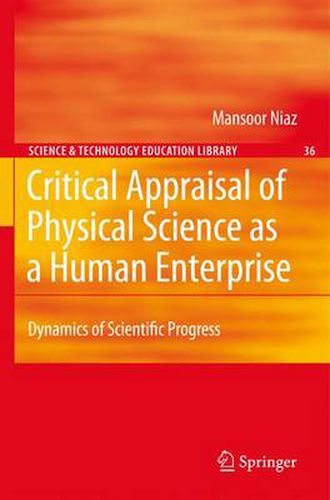Readings Newsletter
Become a Readings Member to make your shopping experience even easier.
Sign in or sign up for free!
You’re not far away from qualifying for FREE standard shipping within Australia
You’ve qualified for FREE standard shipping within Australia
The cart is loading…






This title is printed to order. This book may have been self-published. If so, we cannot guarantee the quality of the content. In the main most books will have gone through the editing process however some may not. We therefore suggest that you be aware of this before ordering this book. If in doubt check either the author or publisher’s details as we are unable to accept any returns unless they are faulty. Please contact us if you have any questions.
It is generally believed that doing science means accumulating empirical data with no or little reference to the interpretation of the data based on the scientist’s th- retical framework or presuppositions. Holton (1969a) has deplored the widely accepted myth (experimenticism) according to which progress in science is presented as the inexorable result of the pursuit of logically sound conclusions from un- biguous experimental data. Surprisingly, some of the leading scientists themselves (Millikan is a good example) have contributed to perpetuate the myth with respect to modern science being essentially empirical, that is carefully tested experim- tal facts (free of a priori conceptions), leading to inductive generalizations. Based on the existing knowledge in a field of research a scientist formulates the guiding assumptions (Laudan et al. , 1988), presuppositions (Holton, 1978, 1998) and hard core (Lakatos, 1970) of the research program that constitutes the imperative of presuppositions, which is not abandoned in the face of anomalous data. Laudan and his group consider the following paraphrase of Kant by Lakatos as an important guideline: philosophy of science without history of science is empty. Starting in the 1960s, this historical school has attempted to redraw and replace the positivist or logical empiricist image of science that dominated for the first half of the twentieth century. Among other aspects, one that looms large in these studies is that of guiding assumptions and has considerable implications for the main thesis of this monograph (Chapter 2).
$9.00 standard shipping within Australia
FREE standard shipping within Australia for orders over $100.00
Express & International shipping calculated at checkout
This title is printed to order. This book may have been self-published. If so, we cannot guarantee the quality of the content. In the main most books will have gone through the editing process however some may not. We therefore suggest that you be aware of this before ordering this book. If in doubt check either the author or publisher’s details as we are unable to accept any returns unless they are faulty. Please contact us if you have any questions.
It is generally believed that doing science means accumulating empirical data with no or little reference to the interpretation of the data based on the scientist’s th- retical framework or presuppositions. Holton (1969a) has deplored the widely accepted myth (experimenticism) according to which progress in science is presented as the inexorable result of the pursuit of logically sound conclusions from un- biguous experimental data. Surprisingly, some of the leading scientists themselves (Millikan is a good example) have contributed to perpetuate the myth with respect to modern science being essentially empirical, that is carefully tested experim- tal facts (free of a priori conceptions), leading to inductive generalizations. Based on the existing knowledge in a field of research a scientist formulates the guiding assumptions (Laudan et al. , 1988), presuppositions (Holton, 1978, 1998) and hard core (Lakatos, 1970) of the research program that constitutes the imperative of presuppositions, which is not abandoned in the face of anomalous data. Laudan and his group consider the following paraphrase of Kant by Lakatos as an important guideline: philosophy of science without history of science is empty. Starting in the 1960s, this historical school has attempted to redraw and replace the positivist or logical empiricist image of science that dominated for the first half of the twentieth century. Among other aspects, one that looms large in these studies is that of guiding assumptions and has considerable implications for the main thesis of this monograph (Chapter 2).